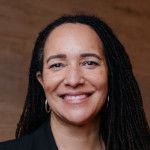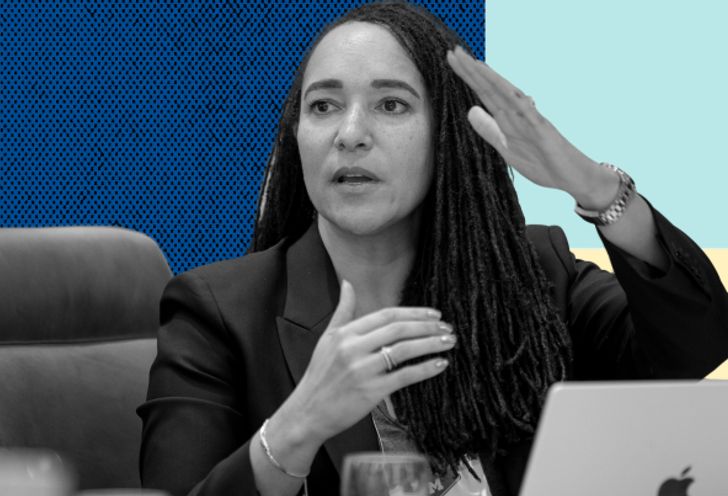A Guiding Force for Organizational Change
From the outset, it was clear that achieving the comprehensive goals set forth in DEI 1.0 would require fundamental and at times seismic shifts in the university’s organizational culture. It was equally clear that implementing and sustaining such massive and pervasive culture change would require exceptional leadership on an institutional level, along with a new infrastructure to provide ongoing administrative and operational support.
In 2016, the university began assembling a DEI leadership team by appointing senior faculty member Robert M. Sellers to serve in the dual posts of Vice Provost for Equity and Inclusion and Chief Diversity Officer (2016-2022), and Katrina Wade-Golden, Associate Vice Provost and Deputy Chief Diversity Officer (2016-present). In August 2022, the university appointed Vice Provost for Equity and Inclusion and Chief Diversity Officer, Tabbye M. Chavous.
Throughout the entire span of DEI 1.0 implementation, the strong and innovative leadership of these individuals and their staff has made it possible for the university to enact far-reaching foundational change at every level, in every unit, in ways that have impacted every individual on campus. Their collaborative efforts and strategic interventions also enabled the U-M community to successfully navigate an array of challenges and crises that included the COVID-19 pandemic, violent political unrest and a nationwide racial reckoning.
Tabbye Chavous, Vice Provost for Equity and Inclusion & Chief Diversity Officer

As a faculty member of the University of Michigan for 25 years, Tabbye Chavous has served in a variety of leadership roles at department, college and central administration levels. Prior to her appointment as Vice Provost for Equity and Inclusion and Chief Diversity Officer in August 2022, Chavous was director of the National Center for Institutional Diversity (NCID). Previously, she served as chair of the U-M’s Combined Program in Education and Psychology (CPEP), as associate dean of academic programs and initiatives at the Rackham Graduate School, as associate vice president for research in the Office of the Vice President for Research, and as associate dean for DEI in the College of Literature, Science, and the Arts (LSA). She is also co-founder and principal investigator of U-M’s Center for the Study of Black Youth in Context.
As Vice Provost and CDO, Chavous noted that the DEI 1.0 Strategic Plan has raised institutional awareness and increased expectations and standards for diversity, equity and inclusion campuswide by aligning policies, procedures and processes with DEI principles. Among her immediate goals is applying the knowledge gained and lessons learned in the initial five DEI plan years for even greater impact moving forward in the implementation of DEI 2.0. In doing so, a key priority is collaborating with campus leaders and community members in building on, refining and sharing successful models and practices; addressing gaps; setting priorities, and launching transformative plans and initiatives.
Katrina Wade-Golden, Associate Vice Provost and Deputy Chief Diversity Officer

Since her appointment in 2016, Katrina Wade-Golden provides crucial administrative leadership, facilitates plan implementation in all 51 units, and serves as an advisor to the more than 100 DEI implementation leads campuswide. Dr. Katrina Wade-Golden is Deputy Chief Diversity Officer within the Office of Diversity, Equity & Inclusion (ODEI), as well as Director of Implementation for the Campuswide Diversity, Equity & Inclusion Strategic Plan. She brings over 25 years of administrative and research experience working with complex longitudinal datasets and has broad expertise leading research and strategy engagements in the corporate, higher education, and non-profit sectors, utilizing a wide range of qualitative and quantitative techniques. Dr. Wade-Golden possesses particular expertise in the areas of measurement, questionnaire design, social psychology, organizational dynamics, institutional diversity, and complex data analyses.
She has published numerous articles, essays, monographs, and reports in these areas, and has published a book (2013), The Chief Diversity Officer: Strategy, Structure, and Change Management (co-authored with Damon A. Williams), that chronicles the work of an ongoing research project focused on Chief Diversity Officers at nearly 800 institutions across the country, and is the first publication to fully explicate the role of chief diversity officers in higher education.
DEI Implementation Leads

With the launch of the Diversity, Equity and Inclusion strategic plan in 2016, the University of Michigan sought to establish overarching strategies and guidelines that would better embed this work across the University.
While striving to build a more welcoming and inclusive environment, University leadership recognized that in order for the strategic plan to be successful, it could not be prescriptive, with all students, faculty, and staff tasked with the same work. The University acknowledged that each school, college and unit were at various points in their DEI efforts, and trying to use a “one size fits all” approach would not be an effective tactic.
Instead, the strategic plan aimed to provide a framework, while the tactical implementation of these efforts needed to be uniquely tailored to every unit at U-M. In creating individualized strategic plans, every school, college and unit was given a certain level of autonomy in developing their programs, staffing and executive leadership, all with the goal of imbuing DEI across the University.
A critical component to this approach was the development of the DEI Implementation Leads Group, better known as “DEI Leads.” These individuals are charged with ensuring that the 51 school, college and unit plans are executed within their respective areas. With at least one designated faculty or staff member for each of the 51 plans, they are responsible for augmenting and tracking the DEI work occurring within their unit. The leads shepherd the work forward, track its efficacy, and work closely with one another.
